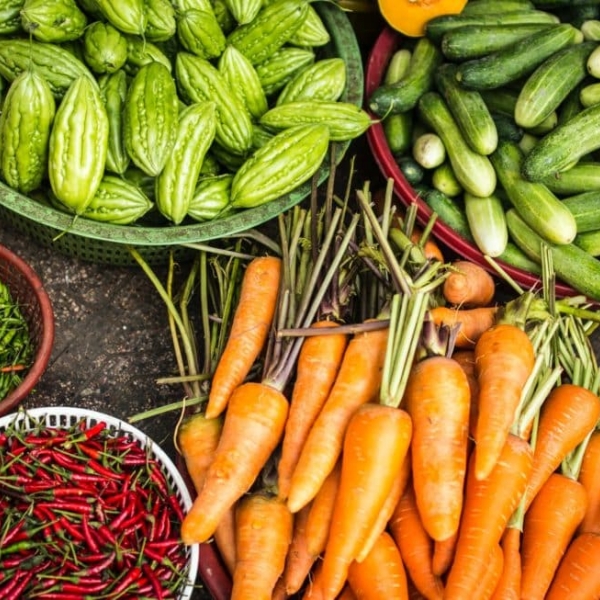Advancing our obesity agenda at the UN Food Systems Summit
The current global food system is not fit for purpose. Focused mainly on providing calories as cheaply as possible, food has inadvertently become a commodity to be profited from at the expense of public health. The dramatic rise in global obesity rates over the last four decades are a symptom of this misaligned system that needs to be fixed.
In September, UN Secretary-General Guterres will host a UN Food Systems Summit (UNFSS) with the aim to set a course to radically transform our food systems. The COVID-19 pandemic has revealed the fragility of our global food architecture, with response measures such as lockdowns restrictions reducing access to healthy food and increasing obesity risks for many vulnerable populations including children. To bring positive changes to the world’s food systems in line with all 17 Sustainable Development Goals, the Summit will bring together key players from science, business, policy, healthcare and academia to launch bold new actions to transform the way the world produces, distributes and consumes food.
The Summit has been organised into Action Tracks focused on different areas of the food system. World Obesity has been particularly engaged in Action Track 2: Shifting to sustainable and healthy consumption patterns. Many of the solutions proposed reflect the recommendations documented in our policy dossiers, for example, on banning digital marketing of junk food to children, taxation of drinks high in sugar and mandating front of pack nutrition labelling to warn consumers about unhealthy products. To coincide with the UNFSS, we will be launching a new dossier on obesity and food systems in September.
Since the start of the year, World Obesity has been actively involved in the Summit preparations. Our President John Wilding is one of the Summit’s Champion and co-authored this blog with the UN Special Envoy Dr Agnes Kalibata, highlighting how: “An overreliance on refined carbohydrates and other energy-dense, highly processed foods that are often the most affordable and available option for poor consumers, is contributing to the rapid rise in observed observed in lower income countries.”
Read more about obesity & UPFs

Unhealthy diets now responsible for more premature deaths and more total deaths than any other risk factor globally. We live in obesogenic environments where proliferation of cheap and available high energy density food dominates, while opportunities to be physically active are reduced, consequently causing excess weight gain. Affordable healthy diets are crucial to prevent obesity but also for management. Obesity is a relapsing disease, thus it will always remain hard to treat while patients must recover in the same obesogenic environment that has contributed to their disease. Unhealthy food environments and lack of access to nutritious diets also perpetuate undernutrition and micro-nutrient deficiencies. Reducing malnutrition in all its forms and redesigning food systems to nourish not harm people are key challenges for the UNFSS.
As described in the 2019 Lancet Commission on Obesity - The Global Syndemic - actions to address obesity can also help tackle undernutrition and climate change. World Obesity will be urging actors at the UNFSS to think in Syndemic terms about the opportunity for ‘triple duty actions’ that can help solve health and sustainability challenges. For example, incentivising more local, sustainable food production, encouraging consumers to eat less red meat and holding governments to account when they fail to implement healthy and sustainable dietary guidelines.

The UNFSS is an opportunity for all those working in obesity to advocate for change to one of the core systems implicated in driving the disease. It is also a key opportunity for enhancing collaboration between health and food actors. At an event around the WHA 74, World Obesity, with other founding members of the Global Obesity Coalition - UNICEF and WHO – brought together food and health stakeholders to discuss the challenges of multi-sector working, as well as opportunities for action on obesity in the context of the UNFSS.
Watch the recording here
Opening the event, The Honourable Dr Chris Tufton, Jamaica’s Minster of Health and Wellness made clear: “Individual strategies cannot solve obesity, a problem which is systemic in nature…our food systems are too focused on profitability…this must change!” The Minister also highlighted how obesity is not just a problem for wealthier countries: the Caribbean has some of the fastest rising obesity rates, which have quadrupled since 1970, with women and adolescents particularly affected. Under his leadership, Minister Tufton is spearheading several initiatives to address obesity, including regulating school environments and promoting new front of package labelling based on the model used in Chile.
Read more about civil society action to address NCDs in the Caribbean.



During the interactive panel discussion, Dr Nancy Aburto described her vision for food and health actors working more collaboratively, and how the UNFSS provides concrete entry points to have impacts on all forms of malnutrition. Professor Shifalika Goenka from the Public Health Foundation of India reminded us that we cannot talk about obesity alone: the same food systems are giving rise to obesity and undernutrition. Prof Goenka called for the need to incentivise local production of healthy foods to tackle poverty as well as malnutrition in India and other low-and middle-income countries.
Maiike Arts and Vilma Tyler from UNICEF spoke to the challenge of childhood obesity: more than 340 million school-aged children and adolescents worldwide are affected by overweight or obesity, which has been potentially exacerbated by COVID-19 pandemic and related lockdown. In today’s food system, many children’s foods are ultra-processed and packed with excess calories, added sugar, salt and unhealthy fats. Children are bombarded with marketing for unhealthy foods, on television, online, in schools, and in supermarkets, especially in poorer areas.

As well as policy actions mentioned above, speakers highlighted how we need to change the narrative around overweight and obesity. It is not children’s fault they are affected by obesity, nor adults. Obesity is the consequence of a food system that fails to provide easy access to nutritious foods and instead promotes foods that are unhealthy.
"We need to scale up the implementation of proven solutions that work. Food labelling. Better school food policies. And putting an end to unhealthy food marketing that targets children." Vilma Tyler UNICEF
Announced on World Obesity Day, Johanna Ralston presented the ambitions for the new Global Obesity Coalition. Getting the “first food system” right for young children, including efforts to ensure baby foods are not promoted inappropriately and do not contain too much sugar, unhealthy fats or salt is a priority for UNICEF and will be a core part of the work of the new Global Obesity Coalition.
Ultimately, addressing obesity requires a decisive shift from unilateral approaches towards streamlined and purposeful cooperation between different stakeholders. Stronger leadership, systems-based approaches and a narrative shift are required in order to implement solutions that go beyond individual behaviour change.
Within the context of existing frameworks and commitments, the Global Obesity Coalition will streamline priority global initiatives, scale up national policymaking efforts to create healthy environments, and support health systems as they seek to ‘build back better’ from the COVID-19 pandemic. The Coalition will be organised along priorities for which a joint effort is especially beneficial:
- Shifting the obesity narrative
- Accelerating implementation of effective actions that promote healthy diets and physical activity
- Integrating obesity prevention, management and treatment into primary health care.
Although food systems are only one piece of the obesity puzzle, they are a crucial one. The UNFSS offers an opportunity for all working in obesity to play a part in creating healthier, more just and sustainable food systems.
Contact us
World Obesity will soon be sharing more details on how to support our obesity advocacy at the UNFSS. Please contact Rachel Thompson for more information.
Contact us